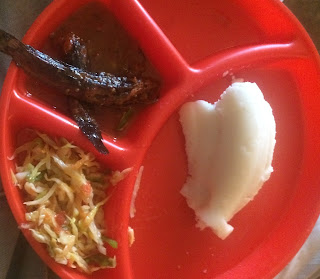 |
| Approaching the Airfield where i'm staying as the sun sets on Dedza Photo: Jason Lunn |
I have become settled in Dedza and found a home for myself in this small, dusty, rural town - different as it is from the world I spent the first twenty-three years of my life living in. I won't waste my time describing the town - to anyone familiar with Malawi it will not need describing and to anyone unfamiliar, my description simply would not do it justice. All I can tell you is to come and experience it for yourself. My inadequate description giving you a snippet of the last week or so is as follows…
 |
| At the Kwhatu Lodge you could be almost anywhere Photo: Jason Lunn |
The last week has been a hectic one. After what seemed a relatively slow start we were out in the communities in force - meeting teachers, organising events and delivering sexual health lessons to teenagers, all the while praying our ancient minibus didn't break down as it crawled through the mountains.
 |
| Delivering sessions to teenagers addressing SRH myths, rights and gender equality. Photo: Jason Lunn |
 |
| Dan delivering a session at Kalilombe Primary School Photo: Jason Lunn |
Following our productive week, we were rewarded with the long-awaited project trip to the old colonial capital city of Zomba, in Southern Malawi, to reunite with our co-workers from Zomba and Salima. The trip was a resounding success. After driving for over three hours to get to there and seeing Hippos in the Shire River, we could say hello, sweat, and have lunch before our drive back to Dedza. Although brief, the visit allowed us to leave with a good impression of the city and a good idea of the work that the other teams were carrying out in their respective projects. I also had the good fortune of eating Chambo for the first time; a fish native to Lake Malawi with a smokey flavour that is a must-have for your dinner plate or your aquarium, depending on your preference!
 |
| A theatre performance addressing drug and alcohol abuse, organised by YONECO/ICS, Zomba. Photo: Jason Lunn |
 |
| Brave from the Dedza team pretending to play some kind of instrument in Zomba Photo: Jason Lunn |
After a mixture of work and time to relax, we arrived fresh on Monday morning for a meeting with our partner organisation, CYECE, to outline the activities planned for the upcoming week. Twenty cigarettes, a portion of goat, chips and a cold soft-drink took a dent of 90p out of my pocket at lunch time and was adequate preparation for the afternoon to come. At around 1.30 PM we were greeted by the Ntcheu team who had elected to come to Dedza for their project trip. The fun thing about Ntcheu is that it's very similar to Dedza, only slightly larger and a lot more intense. As such the Ntcheu team smartly avoided having to see anything new and exciting, so we quickly put them to work. We walked to the nearby village of Takomana where we met the Chief before surveying local families. One of the lessons I've learned being here is that Malawians are very patient and as such we were openly received by everyone. Our mission was to find information about the families with children of school-going age; whether these children were in school, and if they weren't, why this was the case and what are the challenges they face getting their children to school. I cannot speak for the entire team but for the houses I interviewed all of the children were in education despite a plethora of major issues, which says a great deal of the resilience of the people.
 |
| The Dedza and Ntcheu teams begin their 10 minute (10 Malawian minutes is around 45 minutes) journey to Takomana Photo: Jason Lunn |
Since primary education was made available for free, the number of students enrolling has increased dramatically and as such, the government of Malawi have found it very difficult to provide staff and resources to meet the growing demand. This means that students often sit on the floor, with no equipment and in class sizes of up to 100 students. According to UNESCO, 11% of primary school-aged children do not attend. Some parents told us children have to walk great distances to get to school which is more difficult during the rainy season.
 |
| Dedza and Ntcheu team pictured with Chief Takomana |
Following our afternoon, we retired to a local bar and relaxed with some Mozambican Vinhao - a sweet wine that is ubiquitous in Dedza. We caught up with the team and I arrived back at my home to find that the power was on and my phone's internet was running quickly - two great luxuries these days. Living here has not been without its difficulties! But despite the difficulties, the lack of amenities and the ever-present poverty, Malawi is an exciting and friendly place to those willing to embrace it. Full of interesting characters, new experiences and daily realities that are mind-blowing to a humble boy from Outer West London, Malawi and Dedza have won a place in my heart for as long as it keeps ticking.
Written by Dan Lloyd































